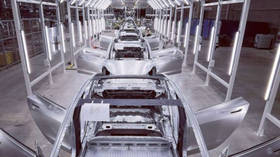Tesla fans to wait months to get newly purchased cars

The global chip supply crisis has reportedly left buyers of Tesla and other electric vehicles (EVs) in China waiting up to several months for their new cars to be delivered.
Producers of car components and assemblers in China and across the world are desperately striving to meet the surging consumer demand.
The EV market has been hit especially hard, as it requires more semiconductors than traditional automakers.
Buyers ordering Shanghai-made Model 3 and Model Y vehicles won’t see their new cars until the end of the first quarter, according to two sales managers at Tesla quoted by the South China Morning Post.
“Insufficient supply of chips is a major stumbling block to sales growth ahead of the Lunar New Year,” Tian Maowei, a manager with Yiyou Auto Service in Shanghai, told the media. “Some buyers have lodged complaints about a long delay of the deliveries.”
Last year, the fast-spreading global shortage of semiconductors caused massive disruption to the automotive industry and is expected to continue in 2022 and potentially beyond. Smaller assemblers are even expected to suspend production this year.
According to AutoForecast Solutions, which compiles production estimates for the sector, the crisis forced global car manufacturers to slash production by 11 million units in 2021. Meanwhile, Chinese automakers reportedly had to cut output by more than 1 million vehicles.
The China Passenger Car Association (CPCA) reported that global foundries in mainland China, the world’s largest automotive market, can manufacture enough semiconductors, microcontrollers, and high-end chips with artificial intelligence (AI) processors for some 4 million new energy vehicles, or NEV, a term used in China to refer to electric and hybrid vehicles. That leaves a shortfall of about 1 million units, the association says, citing the projected demand for this year.
Moreover, the crisis is reportedly exacerbated by expanding lead times for semiconductors. According to Pennsylvania-based Susquehanna Financial Group, the period between when a chip is ordered and when it ships increased to 25.8 weeks in December, six days longer than the month before.
The global auto chip supply chain also remains vulnerable to any outbreak of coronavirus that may easily trigger another suspension of production, according to William Li, chief executive of Shanghai-based Nio, one of the three leading mainland EV start-ups.
For more stories on economy & finance visit RT's business section














